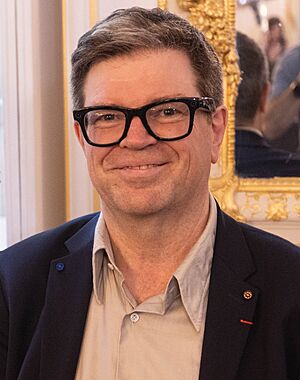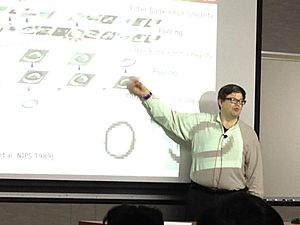Yann LeCun facts for kids
Quick facts for kids
Yann LeCun
|
|
|---|---|

LeCun in 2024
|
|
| Born | 8 July 1960 Soisy-sous-Montmorency, France
|
| Citizenship | |
| Education |
|
| Known for | Deep learning |
| Awards |
|
| Scientific career | |
| Fields | Computer science |
| Institutions |
|
| Thesis | Modeles connexionnistes de l'apprentissage (connectionist learning models) (1987) |
| Doctoral advisor | Maurice Milgram |
Yann LeCun (/ləˈkʌn/ LƏ-kun) is a famous French-American computer scientist. He is known for his amazing work in machine learning and artificial intelligence (AI). He helps computers learn and "see" the world.
LeCun is a professor at New York University and a top AI scientist at Meta. He is especially famous for creating convolutional neural networks (CNNs). These are special computer programs that help computers recognize images and patterns.
He also helped create DjVu, a way to compress images. This makes image files smaller and easier to share. In 2018, LeCun, along with Yoshua Bengio and Geoffrey Hinton, won the Turing Award. This award is like the Nobel Prize for computer science. They are often called the "Godfathers of Deep Learning" because of their important work.
Contents
Early Life and School

Yann LeCun was born on July 8, 1960, near Paris, France. His family name, Le Cun, comes from an old language spoken in Brittany, France. His first name, Yann, is the Breton version of "John."
He studied engineering at ESIEE Paris and earned his degree in 1983. Later, he got his PhD in computer science in 1987 from Pierre and Marie Curie University. During his PhD, he worked on an early version of a key learning method for neural networks called back-propagation. After his PhD, he spent a year working with Geoffrey Hinton at the University of Toronto.
His Career in Computer Science
Working at Bell Labs
In 1988, LeCun joined AT&T Bell Laboratories in the United States. There, he developed new ways for computers to learn. One of his most important inventions was convolutional neural networks (CNNs), also known as LeNet. These networks are inspired by how the human brain processes images.
He used CNNs to help computers recognize handwriting and read text. For example, a system he helped create was used by banks to read over 10% of all checks in the US in the late 1990s and early 2000s. This shows how practical and useful his inventions were.
In 1996, he became the head of the Image Processing Research Department at AT&T Labs. He worked on the DjVu image compression technology. This technology is still used today by many websites, including the Internet Archive, to share scanned documents.
Teaching at New York University
After a short time at NEC Research Institute, LeCun joined New York University (NYU) in 2003. He became a professor of computer science and neural science. At NYU, he continued his research on how computers can learn and understand images. He also worked on mobile robotics, which involves robots that can move around.
In 2012, he became the first director of the NYU Center for Data Science. This center focuses on using data to solve problems. In 2013, LeCun became the first director of Meta AI Research in New York City. He left his role at NYU-CDS in early 2014 to focus on his work at Meta.
LeCun also helped start the International Conference on Learning Representations in 2013. This is an important meeting where scientists share new ideas about how computers learn. He has also been a visiting professor at Collège de France in Paris. In 2023, he was named the Jacob T. Schwartz Chaired Professor in Computer Science at NYU.
Awards and Honors
Yann LeCun has received many important awards for his contributions to computer science. He is a member of the US National Academy of Sciences and the French Académie des Sciences.
He has received honorary doctorates from several universities around the world. In 2014, he received the IEEE Neural Network Pioneer Award. In 2015, he was given the PAMI Distinguished Researcher Award.
In 2018, he received the IRI Medal and the Harold Pender Award. In 2019, he won the Golden Plate Award from the American Academy of Achievement.
The biggest award he received was the 2018 Turing Award, which he shared with Yoshua Bengio and Geoffrey Hinton. This award recognized their groundbreaking work on deep learning.
In 2022, he received the Princess of Asturias Awards for Scientific Research, along with Bengio, Hinton, and Demis Hassabis. In 2023, the President of France made him a Knight of the French Legion of Honour.
In 2024, he received the Global Swiss AI Award and the grand prize of the VinFuture Prize. He shared the VinFuture Prize with Bengio, Hinton, Jensen Huang, and Fei-Fei Li for their work on neural networks. In 2025, he was awarded the Queen Elizabeth Prize for Engineering with several other leading scientists.
See also
 In Spanish: Yann LeCun para niños
In Spanish: Yann LeCun para niños
 | Jessica Watkins |
 | Robert Henry Lawrence Jr. |
 | Mae Jemison |
 | Sian Proctor |
 | Guion Bluford |

